
views
Deciding Which Items to Keep

Determine why you’ve been keeping each item. Ask yourself what each item represents for you. For instance, it could remind you of a special memory or might have been a gift from someone special. Think about why an item is important so you can decide if you’re ready to let it go. As an example, you might have kept old birthday cards that remind you how loved you are. You might also have heirlooms that your grandparents gave you or concert stubs that remind you how much fun you had with your friends.

Decide if an item brings you happiness. Don’t feel pressured to keep items that are stressing you out or making it hard for you to live the life you want. Ask yourself if each sentimental item you have makes you feel happy or not. Only keep items that bring you joy. For instance, let’s say a loved one gave you a decorative plate they hand painted. You might choose to keep this item because it makes you feel happy. On the other hand, you might let go of a flower bouquet that you caught at a wedding because it’s just gathering dust.

Ask yourself if the giver of a gift would want you burdened. Gifts are one of the hardest sentimental items to let go, but that doesn’t mean you have to let gifts clutter up your life. To help you release gifts, remind yourself that your friends and family likely want you to live a happy life. If a gift isn’t serving you, give it away or sell it. Additionally, keep in mind that the person who gave you the gift likely wants it to be used and enjoyed. If you aren’t using a gifted item, give it to someone who will.
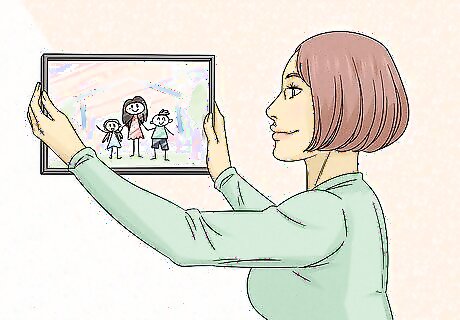
Identify how this item fits into your daily life. It may be easier to let items go if you recognize that they aren’t helping you live the life you want. When you’re evaluating an item, consider if you ever use the item or currently display it as a decoration. If it’s not something you use or need, let it go so it’s not becoming clutter. As an example, let’s say you have a stack of drawings that your child made. These can be super hard to get rid of, but it may be easier if you pick 1 to display and let the others go. This way you can remember their drawings every day without having the excess clutter.

Get a second opinion from someone who isn’t sentimental. If you’re a very sentimental person, it might be hard to tell what’s important and what isn’t. Talking to someone who isn’t sentimental may help you get perspective on an item. Ask for help with difficult items if you’re having trouble letting things go. For instance, you might ask your best friend to help you sort items. If you can’t find someone to come over and help, snap a photo and text it to someone you trust. Ask, “Should I keep this item or let it go? It’s been stored at the back of my closet.”
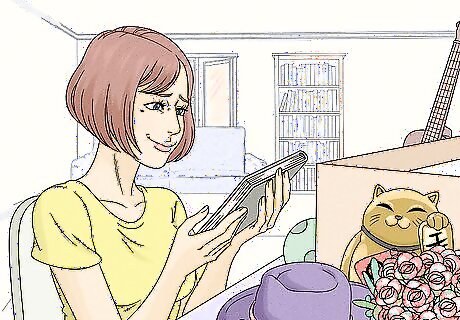
Pick your most cherished items to keep but let the rest go. It’s easier to pick out what you do want versus what you want to let go. Focus on identifying the items that you want to keep. Then, donate or give away all of the remaining items. This will help you feel like you’re creating a life that you love rather than letting go of things that are important to you. If you feel obligated to keep something, it's probably best to just let it go. Only keep items you truly want.
Evaluating Your Living Space
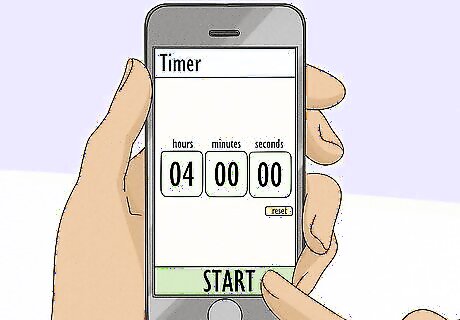
Give yourself a time limit for clearing your space. Sorting clutter is really hard for most people, and it’s easy for your progress to stall. To keep yourself on track, set a time limit for your cleaning sessions and set a goal for completing your clear out. This will prevent you from getting stuck in the clear out phase of organizing your home. For instance, set a goal to complete your clear out in 1 weekend or give yourself a 4-hour block to work. If you have a lot of stuff, you may need to do several cleaning days to purge all of your excess clutter. Don't feel pressured to do it all in one day if you're struggling.
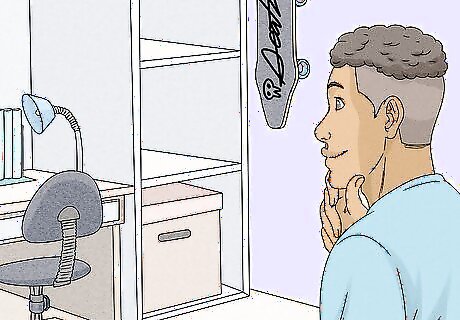
Determine how much space you have to display or store items. Walk through your living space and imagine how you want it to look. Consider the space you have to display and store items, as well as how you want to use your space. This will help you figure out how many sentimental items you can save. It’s important to be aware of the space you have so you can decide where you’ll place each item you save. If you can’t find a spot for an item, it’s best to let it go.
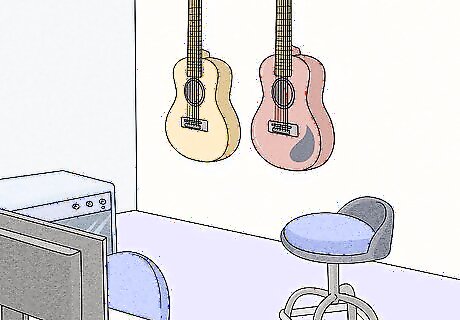
Prioritize keeping items that fit in with your lifestyle. Your home should help you live your best life, but clutter can prevent you from doing what you like. Consider how much space you need to enjoy your hobbies and interests. As you sort your items, think about how each item will affect your ability to live the life you want in your home. For instance, let’s say you enjoy cooking. Consider how much space you need to display or store your cooking gear. Make sure you can easily access your gear and ingredients. Similarly, you might enjoy playing the guitar. Pick a spot to display your guitar and make sure you have space to practice.
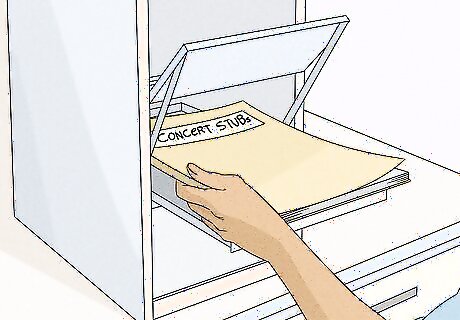
Designate a small space or box for sentimental items. It’s okay to keep sentimental items if they’re important to you. To avoid creating a lot of sentimental clutter, limit yourself to a small space for storage. Display or store the items, depending on what works best for you. For example, you might designate a single shelf for sentimental items or a small shoe box for memorabilia like photos, movie tickets, and concert stubs.
Releasing Items You No Longer Need
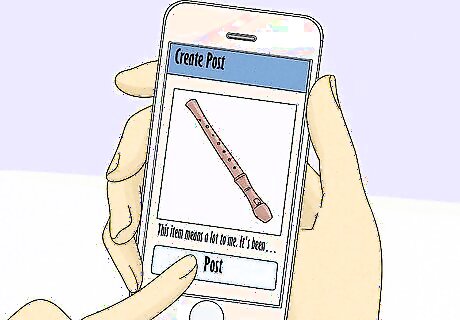
Share the memory of items you don’t want so it’s easier to let them go. Letting go of a sentimental item can feel like you’re giving up a memory, but that’s not really true. However, honoring your memories may help you feel better about clearing out your clutter. Tell someone else about the memory a special item represents. This helps you preserve your memories without having to hold onto the item. For instance, post a photo of the item on your social media account and tell the story about it. If you have concert stubs from when you were first dating your significant other, you might send them a pic of the stubs with a comment about your favorite concert.

Say “goodbye” to items you want to let go. You might feel silly telling an inanimate object “goodbye,” but doing so can make it easier to let an item go. Saying “goodbye” creates closure and helps you honor the memory associated with the item you’re letting go. As you sort your items, tell each individual item “goodbye” or say it to all of the items you’re letting go at once. Marie Kondo, author of The Life Changing Magic of Tidying Up, encourages you to say, “Thank you,” to items you no longer need.
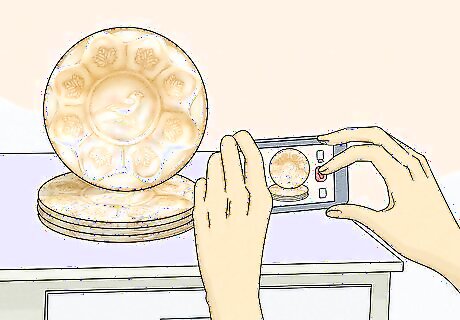
Collect photos of sentimental items instead of clutter. Take a photo of items you’re releasing so you can remember them. Snap a photo and save it to a digital folder so you can look at it whenever you like. Moving forward, avoid creating more clutter by photographing special items rather than saving them. For instance, you might save 1 drawing that your child made and photograph the rest. Similarly, let’s say your grandparents left you a set of dishes you don’t like. Take a photo of the dishes set out on the table, then donate them to someone who will cherish them.Tip: Keeping digital photos and storing them in the cloud can help you further cut back on clutter in your home.
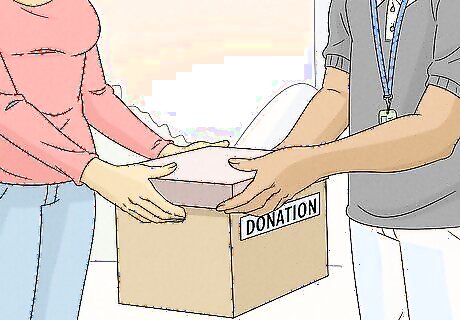
Donate or give away items you no longer need. It'll be easier to let go of your items if you know they're going to a good home. Check with your family and friends to see if they want heirlooms or items you know they may like. Take your remaining items to a charity that collects items for people in need or a thrift shop that resales used goods. You could also sell your unwanted items at a garage sale or online. However, don't bring unsold items back into your home.















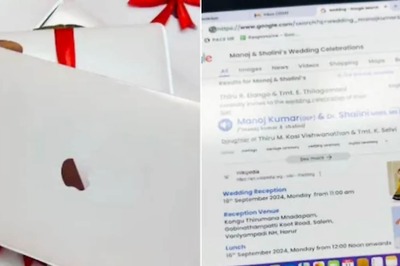




Comments
0 comment